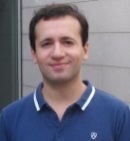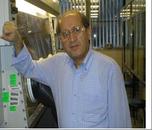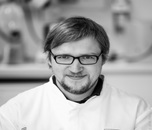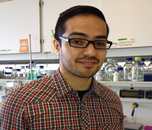Theme: Glycobiology: Simple construction of sweet glycoprobes
Glycobiology 2017
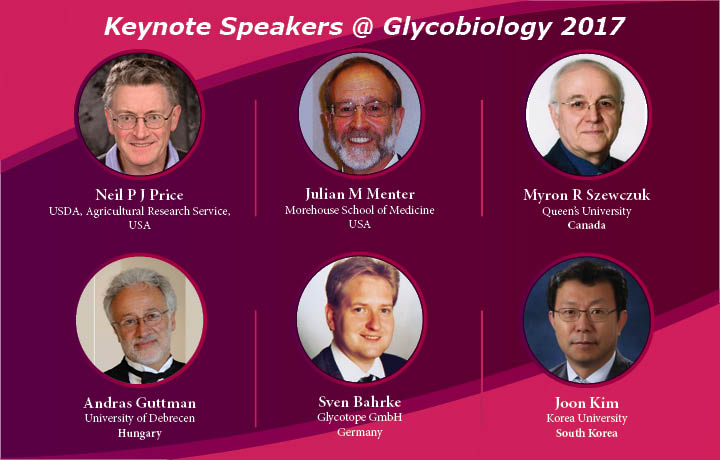
Welcome Message from Dr. Neil P. J. Price

Neil P. J. Price
USDA, Agricultural Research Service
NCAUR, Peoria, IL, USA
Dear Colleagues,
On behalf of the organizing committee and the ConferenceSeries Ltd, it is my pleasure to welcome you to Glycobiology-2017, to be held during June 26-28, 2017 in London, England. This is the 3rd annual Glycobiology World Congress, following successful previous conferences held in Philadelphia, 2015 and Atlanta, 2016. We extend this welcome to all of the participants from across the globe to take part in this premier event in the beautiful city of London.
The field of glycobiology has moved rapidly since our first Glycobiology conference in 2015. Antibiotic and vaccine development, and renewable bio-energy are major drivers of new research and applications. Technical advances have occurred, especially in mass spectrometry, glycomics, NMR, and labeling and imaging technologies. Biomedical and basic fundamental research into glycolytic enzymes, metabolism, prebiotic oligosaccharides, and plant and microbial cell walls have highlighted the importance of glycobiology to the commercially important businesses of biotechnology and medicine.
Glycobiology-2017, hosted by ConferenceSeries Ltd Meetings, is a three day event consisting of a scientific program, comprehensive talks, special sessions, and oral & poster presentations of peer-reviewed contributed papers. We provide a platform where you can exchange your knowledge and experiences with the developing trends in the related fields of glycobiology and carbohydrates. We anticipate interesting new ideas being opened up via the research talks and presentations, and I am looking forward to meeting with you at London, UK this June.
With my regards,

Dr. Neil P. J. Price
USDA, Agricultural Research Service
NCAUR, Peoria, IL, USA
ConferenceSeries Ltd invites all the participants across the globe to attend the 3rd Glycobiology World Congress (Glycobiology -2017) during June 26-28, 2017 at London, UK.
The conference was marked with the attendance of Editorial Board Members, Scientists, young and brilliant researchers, business delegates and talented student communities representing more than 25 countries, who made this conference fruitful and productive. Glycobiology-2017 mainly concentrates on Role of glycans and there Infectious Diseases, amalgamating the branches of Biochemistry where the specialization deals with the diagnosis and treatment of Diseases and its related fields. Glycobiology -2017 hosted by ConferenceSeries Ltd meetings which is a three day event consisting of a scientific program, comprehensive talks, special sessions, oral & poster presentations of peer-reviewed contributed papers and exciting and innovative research products which can be exhibited for the further development of Glycobiology. We provide a platform where you can exchange your knowledge and experiences with the developing trends in the related fields of Glycobiology. Glycobiology -2017 will schedule and coordinate all meetings with our Editorial Board Members and other experts in the Glycobiology field across the world. The scientific program paves a way to gather visionaries through the research talks and presentations and put forward many thought provoking strategies on Glycobiology-2017.
Glycobiology conference -2017 is designed to meet all renowned and eminent speakers from all around the globe with delegates, exhibitors, industry experts and work shop symposiums.
For more details: http://glycobiology.conferenceseries.com/
Scientific Sessions:
Track: 1 Glycobiology
Glycobiology is the study of the structure, biosynthesis and biology of saccharides that are widely distributed in nature. Sugars or saccharides are essential components of all living things and aspects of the various roles they play in biology and are researched in various medical, biochemical and biotechnological fields. The study of glycan structures is also complicated by the lack of a direct template for their biosynthesis, contrary to the case with proteins where their amino acid sequence is determined by their corresponding gene.
Relevant Conferences: Glycobiology Conferences | Biochemistry Conferences
2nd International Conference on Enzymology and Molecular Biology, March 20-21, 2017 Rome, Italy; 8th International Conference on Proteomics and Bioinformatics, May 22-24, 2017 Osaka, Japan; 2nd International Conference on Nucleic Acids, Molecular Biology and Biologics, August 31-September 01, 2017 Philadelphia, USA; 3rd International Conference on Genetic and Protein Engineering, November 08-09, 2017 Las Vegas, USA; 3rd International Conference on Lipid Science and Technology, December 11-13, 2017 Rome, Italy; International Glycobiology Symposium, February 03-04, 2017 San Diego, USA; 12th Jenner Glycobiology and Medicine Symposium, May 06-09, 2017 Dubrovnik, Croatia; 19th European Carbohydrate Symposium, July 02-06, 2017 Barcelona, Spain; 24th International Symposium on Glyconjugates, August 27- September 01, 2017, Jeju Island, Korea.
Track: 2 Genomics
Genomics is the study of the genome in contrast to genetics which refers to the study of genes and their roles in inheritance. Genomics can be considered a discipline in genetics. It applies recombinant DNA, DNA sequencing methods and bioinformatics tools to sequence, assemble and analyze the function and structure of genomes with the complete set of DNA within a single cell of an organism. Advances in genomics have triggered a revolution in discovery-based research to understand even the most complex biological systems such as the brain. The field includes efforts to determine the entire DNA sequence of organisms and fine-scale genetic mapping.
Relevant Conferences: Glycobiology Conferences | Biochemistry Conferences
2nd International Conference on Enzymology and Molecular Biology, March 20-21, 2017 Rome, Italy; 8th International Conference on Proteomics and Bioinformatics, May 22-24, 2017 Osaka, Japan; 2nd International Conference on Nucleic Acids, Molecular Biology and Biologics, August 31-September 01, 2017 Philadelphia, USA; 3rd International Conference on Genetic and Protein Engineering, November 08-09, 2017 Las Vegas, USA; 3rd International Conference on Lipid Science and Technology, December 11-13, 2017 Rome, Italy; International Glycobiology Symposium, February 03-04, 2017 San Diego, USA; 12th Jenner Glycobiology and Medicine Symposium, May 06-09, 2017 Dubrovnik, Croatia; 19th European Carbohydrate Symposium, July 02-06, 2017 Barcelona, Spain; 24th International Symposium on Glyconjugates, August 27- September 01, 2017, Jeju Island, Korea.
Track: 3 Mass Spectrometry
Mass spectrometry (MS) - based proteomics allows the sensitive and accurate quantification of almost complete proteomes of complex biological fluids and tissues. At the moment, however, the routinely usage of MS-based proteomics is prevented and complicated by the very complex work flow comprising sample preparation, chromatography, MS measurement followed by data processing and evaluation. The new technologies, products and assays developed by Precision Proteomics could help enabling and establishing mass spectrometry (MS) - based proteomics in academic and pharmaceutical research as well as in clinical diagnostics.
Relevant Conferences: Glycobiology Conferences | Biochemistry Conferences
2nd International Conference on Enzymology and Molecular Biology, March 20-21, 2017 Rome, Italy; 8th International Conference on Proteomics and Bioinformatics, May 22-24, 2017 Osaka, Japan; 2nd International Conference on Nucleic Acids, Molecular Biology and Biologics, August 31-September 01, 2017 Philadelphia, USA; 3rd International Conference on Genetic and Protein Engineering, November 08-09, 2017 Las Vegas, USA; 3rd International Conference on Lipid Science and Technology, December 11-13, 2017 Rome, Italy; International Glycobiology Symposium, February 03-04, 2017 San Diego, USA; 12th Jenner Glycobiology and Medicine Symposium, May 06-09, 2017 Dubrovnik, Croatia; 19th European Carbohydrate Symposium, July 02-06, 2017 Barcelona, Spain; 24th International Symposium on Glyconjugates, August 27- September 01, 2017, Jeju Island, Korea.
Track: 4 Glycans in Drug Design
Glycans are components of many bio-therapeutic agents, ranging from natural products to molecules based on rational design to recombinant glycoproteins. The glycan components of these agents can be important determinants of their biological activity and therapeutic efficacy. Biochemistry and Glycobiology involves a multidisciplinary study of carbohydrate-binding proteins (lectins), glycolipids and some other plant proteins that are capable of interacting with endogenous or foreign (macro) molecules.
Relevant Conferences: Glycobiology Conferences | Biochemistry Conferences
2nd International Conference on Enzymology and Molecular Biology, March 20-21, 2017 Rome, Italy; 8th International Conference on Proteomics and Bioinformatics, May 22-24, 2017 Osaka, Japan; 2nd International Conference on Nucleic Acids, Molecular Biology and Biologics, August 31-September 01, 2017 Philadelphia, USA; 3rd International Conference on Genetic and Protein Engineering, November 08-09, 2017 Las Vegas, USA; 3rd International Conference on Lipid Science and Technology, December 11-13, 2017 Rome, Italy; International Glycobiology Symposium, February 03-04, 2017 San Diego, USA; 12th Jenner Glycobiology and Medicine Symposium, May 06-09, 2017 Dubrovnik, Croatia; 19th European Carbohydrate Symposium, July 02-06, 2017 Barcelona, Spain; 24th International Symposium on Glyconjugates, August 27- September 01, 2017, Jeju Island, Korea.
Track: 5 Glyco-proteomics
Glycobiology along with the field of proteomics, particularly the application of mass spectrometry analysis to protein samples, is well-established and growing rapidly. Proteomics studies along with glycans generate large volumes of raw experimental data and inferred biological results. To facilitate the dissemination of these data, centralized data repositories have been developed that make the data and results accessible to proteomics researchers and biologists alike. Experimental analysis of proteomics data repositories focuses exclusively on freely-available, centralized data resources that disseminate or store experimental mass spectrometry data and results.
Relevant Conferences: Glycobiology Conferences | Biochemistry Conferences
2nd International Conference on Enzymology and Molecular Biology, March 20-21, 2017 Rome, Italy; 8th International Conference on Proteomics and Bioinformatics, May 22-24, 2017 Osaka, Japan; 2nd International Conference on Nucleic Acids, Molecular Biology and Biologics, August 31-September 01, 2017 Philadelphia, USA; 3rd International Conference on Genetic and Protein Engineering, November 08-09, 2017 Las Vegas, USA; 3rd International Conference on Lipid Science and Technology, December 11-13, 2017 Rome, Italy; International Glycobiology Symposium, February 03-04, 2017 San Diego, USA; 12th Jenner Glycobiology and Medicine Symposium, May 06-09, 2017 Dubrovnik, Croatia; 19th European Carbohydrate Symposium, July 02-06, 2017 Barcelona, Spain; 24th International Symposium on Glyconjugates, August 27- September 01, 2017, Jeju Island, Korea.
Track: 6 Glyco-Bioinformatics
Glycobiology and Glycochemistry are the two main intertwined areas of Glycosciences, dealing with various aspects of glycans, including carbohydrate structure, biochemistry, biological functions and applications. This is necessary in order to sustain and advance the identification of key glycobiological aspects and the application of glycans and glyco-engineering strategies in the design of novel therapies to improve human health. Drug targeting is important for our understanding of human health and disease, and for the development of new therapeutic strategies.
Relevant Conferences: Glycobiology Conferences | Biochemistry Conferences
2nd International Conference on Enzymology and Molecular Biology, March 20-21, 2017 Rome, Italy; 8th International Conference on Proteomics and Bioinformatics, May 22-24, 2017 Osaka, Japan; 2nd International Conference on Nucleic Acids, Molecular Biology and Biologics, August 31-September 01, 2017 Philadelphia, USA; 3rd International Conference on Genetic and Protein Engineering, November 08-09, 2017 Las Vegas, USA; 3rd International Conference on Lipid Science and Technology, December 11-13, 2017 Rome, Italy; International Glycobiology Symposium, February 03-04, 2017 San Diego, USA; 12th Jenner Glycobiology and Medicine Symposium, May 06-09, 2017 Dubrovnik, Croatia; 19th European Carbohydrate Symposium, July 02-06, 2017 Barcelona, Spain; 24th International Symposium on Glyconjugates, August 27- September 01, 2017, Jeju Island, Korea.
Track: 7 Glyco Immunology
Glycomics the scientific attempt to characterize and study carbohydrates, is a rapidly emerging branch of science, for which informatics is just beginning. Glycomics requires sophisticated algorithmic approaches. Several algorithms and models have been developed for glycobiology research in the past several years. The development and use of informatics tools and databases for glycobiology and glycomics research has increased considerably in recent years. However, the general development in this field can still be considered as being in its infancy when compared to the genomics and proteomics areas. In terms of bioinformatics in glycobiology, there are several paths of research that are currently in progress. The development of algorithms and software tools for interpretation of glycans to reliably support the characterization of glycan structures for high-throughput applications is the most immediate demand of the glycomics community.
Relevant Conferences: Glycobiology Conferences | Biochemistry Conferences
2nd International Conference on Enzymology and Molecular Biology, March 20-21, 2017 Rome, Italy; 8th International Conference on Proteomics and Bioinformatics, May 22-24, 2017 Osaka, Japan; 2nd International Conference on Nucleic Acids, Molecular Biology and Biologics, August 31-September 01, 2017 Philadelphia, USA; 3rd International Conference on Genetic and Protein Engineering, November 08-09, 2017 Las Vegas, USA; 3rd International Conference on Lipid Science and Technology, December 11-13, 2017 Rome, Italy; International Glycobiology Symposium, February 03-04, 2017 San Diego, USA; 12th Jenner Glycobiology and Medicine Symposium, May 06-09, 2017 Dubrovnik, Croatia; 19th European Carbohydrate Symposium, July 02-06, 2017 Barcelona, Spain; 24th International Symposium on Glyconjugates, August 27- September 01, 2017, Jeju Island, Korea.
Track: 8 Glyco-Biomarkers
Glycans can mediate a wide variety of biological roles by virtue of their mass, shape, charge, or other physical properties. However, many of their more specific biological roles are mediated via recognition by GBPs. Nature appears to have taken full advantage of the vast diversity of glycans expressed in organisms by evolving protein modules to recognize discrete glycans that mediate specific physiological or pathological processes. The natural ligands for most lectins are typically complex glycoconjugates that carry clustered arrays of the cognate carbohydrate or unique glycan structures, thus cooperating with clustered lectin-binding sites to generate high-avidity binding, which is further enhanced by mass transport effects (high local concentrations of ligands).
Relevant Conferences: Glycobiology Conferences | Biochemistry Conferences
2nd International Conference on Enzymology and Molecular Biology, March 20-21, 2017 Rome, Italy; 8th International Conference on Proteomics and Bioinformatics, May 22-24, 2017 Osaka, Japan; 2nd International Conference on Nucleic Acids, Molecular Biology and Biologics, August 31-September 01, 2017 Philadelphia, USA; 3rd International Conference on Genetic and Protein Engineering, November 08-09, 2017 Las Vegas, USA; 3rd International Conference on Lipid Science and Technology, December 11-13, 2017 Rome, Italy; International Glycobiology Symposium, February 03-04, 2017 San Diego, USA; 12th Jenner Glycobiology and Medicine Symposium, May 06-09, 2017 Dubrovnik, Croatia; 19th European Carbohydrate Symposium, July 02-06, 2017 Barcelona, Spain; 24th International Symposium on Glyconjugates, August 27- September 01, 2017, Jeju Island, Korea.
Track: 9 Glycoprotein Technologies
Glycans quickly became overshadowed as DNA- and protein-focused treatments became readily accessible. The recent development of new tools and techniques to study and produce structurally defined carbohydrates has spurred renewed interest in the therapeutic applications of glycans. Glycan Analysis review focuses on advances within the past decade that are bringing glycan-based treatments back to the forefront of medicine and the technologies that are driving these efforts. These include the use of glycans themselves as therapeutic molecules as well as engineering protein and cell surface glycans to suit clinical applications to that of databases providing glycoenzyme data. Glycoconjugates offer a rich and promising frontier for developments in the academic, biopharmaceutical, and medical fields.
Relevant Conferences: Glycobiology Conferences | Biochemistry Conferences
2nd International Conference on Enzymology and Molecular Biology, March 20-21, 2017 Rome, Italy; 8th International Conference on Proteomics and Bioinformatics, May 22-24, 2017 Osaka, Japan; 2nd International Conference on Nucleic Acids, Molecular Biology and Biologics, August 31-September 01, 2017 Philadelphia, USA; 3rd International Conference on Genetic and Protein Engineering, November 08-09, 2017 Las Vegas, USA; 3rd International Conference on Lipid Science and Technology, December 11-13, 2017 Rome, Italy; International Glycobiology Symposium, February 03-04, 2017 San Diego, USA; 12th Jenner Glycobiology and Medicine Symposium, May 06-09, 2017 Dubrovnik, Croatia; 19th European Carbohydrate Symposium, July 02-06, 2017 Barcelona, Spain; 24th International Symposium on Glyconjugates, August 27- September 01, 2017, Jeju Island, Korea.
Track: 10 Glycomics and Metabolomics
Glycomics is a discipline in genetics that applies recombinant DNA, DNA sequencing methods and bioinformatics to sequence, assemble and analyze the function and structure of glycans along with the genomes. Metabolomics is a relatively young branch of omics science concerned with the systematic study of the chemical products or metabolites that cells and organisms generate. Indeed, most human metabolomic studies published today, even those exploiting the latest and most sensitive LC-MS/MS technologies, typically succeed in identifying or characterizing fewer than 100 compounds. This includes the human cerebrospinal fluid metabolome the human saliva metabolome and the human serum metabolome.
Relevant Conferences: Glycobiology Conferences | Biochemistry Conferences
2nd International Conference on Enzymology and Molecular Biology, March 20-21, 2017 Rome, Italy; 8th International Conference on Proteomics and Bioinformatics, May 22-24, 2017 Osaka, Japan; 2nd International Conference on Nucleic Acids, Molecular Biology and Biologics, August 31-September 01, 2017 Philadelphia, USA; 3rd International Conference on Genetic and Protein Engineering, November 08-09, 2017 Las Vegas, USA; 3rd International Conference on Lipid Science and Technology, December 11-13, 2017 Rome, Italy; International Glycobiology Symposium, February 03-04, 2017 San Diego, USA; 12th Jenner Glycobiology and Medicine Symposium, May 06-09, 2017 Dubrovnik, Croatia; 19th European Carbohydrate Symposium, July 02-06, 2017 Barcelona, Spain; 24th International Symposium on Glyconjugates, August 27- September 01, 2017, Jeju Island, Korea.
Track: 11 Glycobiology and Biotechnology
Various approaches have taken to understand the biological roles of glycans which include the prevention of initial glycosylation, prevention of glycan chain elongation, alteration of glycan processing, enzymatic or chemical glycosylation of completed chains, genetic elimination of glycosylation sites, and the study of naturally occurring genetic variants and mutants in glycosylation. Glycosylation mainly refers in particular to the enzymatic process that attaches glycans to proteins, lipids, or other organic molecules. This enzymatic process produces one of the fundamental biopolymers found in cells (along with DNA, RNA, and proteins).
Relevant Conferences: Glycobiology Conferences | Biochemistry Conferences
2nd International Conference on Enzymology and Molecular Biology, March 20-21, 2017 Rome, Italy; 8th International Conference on Proteomics and Bioinformatics, May 22-24, 2017 Osaka, Japan; 2nd International Conference on Nucleic Acids, Molecular Biology and Biologics, August 31-September 01, 2017 Philadelphia, USA; 3rd International Conference on Genetic and Protein Engineering, November 08-09, 2017 Las Vegas, USA; 3rd International Conference on Lipid Science and Technology, December 11-13, 2017 Rome, Italy; International Glycobiology Symposium, February 03-04, 2017 San Diego, USA; 12th Jenner Glycobiology and Medicine Symposium, May 06-09, 2017 Dubrovnik, Croatia; 19th European Carbohydrate Symposium, July 02-06, 2017 Barcelona, Spain; 24th International Symposium on Glyconjugates, August 27- September 01, 2017, Jeju Island, Korea.
Track: 12 Glycans in Diseases and Therapeutics
Glycans are saccharides that can be attached to a wide variety of biological molecules through an enzymatic process called glycosylation to augment their function. One of the four fundamental building blocks of life, proteins, carbohydrates (glycans), lipids and nucleic acids, glycans have received the least attention from researchers. Glycans are the predominant molecule on the cell surface and serve as the first point of contact between a cell and other cells, the extracellular matrix and pathogens. The heightened evolutionary pressure of being at the front lines of cellular collaboration and conflict most likely led to the diversification of glycans. Glyco-epitope diversity enhances the role of glycans in the group of debilitating and life-shortening disorders known as congenital muscular dystrophy, or CMD.
Relevant Conferences: Glycobiology Conferences | Biochemistry Conferences
2nd International Conference on Enzymology and Molecular Biology, March 20-21, 2017 Rome, Italy; 8th International Conference on Proteomics and Bioinformatics, May 22-24, 2017 Osaka, Japan; 2nd International Conference on Nucleic Acids, Molecular Biology and Biologics, August 31-September 01, 2017 Philadelphia, USA; 3rd International Conference on Genetic and Protein Engineering, November 08-09, 2017 Las Vegas, USA; 3rd International Conference on Lipid Science and Technology, December 11-13, 2017 Rome, Italy; International Glycobiology Symposium, February 03-04, 2017 San Diego, USA; 12th Jenner Glycobiology and Medicine Symposium, May 06-09, 2017 Dubrovnik, Croatia; 19th European Carbohydrate Symposium, July 02-06, 2017 Barcelona, Spain; 24th International Symposium on Glyconjugates, August 27- September 01, 2017, Jeju Island, Korea.
Track: 13 Glycobiology and Structural biology
Glycobiology and Structural biology seeks to provide a complete and coherent picture of biological phenomena with glycans at the molecular and atomic level. The goals of structural biology include developing a comprehensive understanding of the molecular shapes and forms embraced by biological macromolecules and extending this knowledge to understand how different molecular architectures are used to perform the chemical reactions that are central to life. Most recent topics related to structural biology are: Structural Biochemistry, Structure and Function Determination, Glycolipids, Hybrid Approaches for Structure Prediction, Structural Biology in Cancer Research, Computational Approaches in Structural Biology, Structural Biology Databases.
Relevant Conferences: Glycobiology Conferences | Biochemistry Conferences
2nd International Conference on Enzymology and Molecular Biology, March 20-21, 2017 Rome, Italy; 8th International Conference on Proteomics and Bioinformatics, May 22-24, 2017 Osaka, Japan; 2nd International Conference on Nucleic Acids, Molecular Biology and Biologics, August 31-September 01, 2017 Philadelphia, USA; 3rd International Conference on Genetic and Protein Engineering, November 08-09, 2017 Las Vegas, USA; 3rd International Conference on Lipid Science and Technology, December 11-13, 2017 Rome, Italy; International Glycobiology Symposium, February 03-04, 2017 San Diego, USA; 12th Jenner Glycobiology and Medicine Symposium, May 06-09, 2017 Dubrovnik, Croatia; 19th European Carbohydrate Symposium, July 02-06, 2017 Barcelona, Spain; 24th International Symposium on Glyconjugates, August 27- September 01, 2017, Jeju Island, Korea.
Track: 14 Glycans in Genetic Disorders
Carbohydrates were prominent in the early history of immunology in defining the identity of antigens recognized by antibodies. Numerous carbohydrate-binding proteins, or lectins, have been identified on the surfaces of immune cells. Interactions of lectins with glycans usually require several monosaccharide moieties presented in the correct conformation for high-affinity binding. Modification of proteins and lipids by glycosylation is a highly regulated process resulting in a diverse repertoire of glycan structures.
Relevant Conferences: Glycobiology Conferences | Biochemistry Conferences
2nd International Conference on Enzymology and Molecular Biology, March 20-21, 2017 Rome, Italy; 8th International Conference on Proteomics and Bioinformatics, May 22-24, 2017 Osaka, Japan; 2nd International Conference on Nucleic Acids, Molecular Biology and Biologics, August 31-September 01, 2017 Philadelphia, USA; 3rd International Conference on Genetic and Protein Engineering, November 08-09, 2017 Las Vegas, USA; 3rd International Conference on Lipid Science and Technology, December 11-13, 2017 Rome, Italy; International Glycobiology Symposium, February 03-04, 2017 San Diego, USA; 12th Jenner Glycobiology and Medicine Symposium, May 06-09, 2017 Dubrovnik, Croatia; 19th European Carbohydrate Symposium, July 02-06, 2017 Barcelona, Spain; 24th International Symposium on Glyconjugates, August 27- September 01, 2017, Jeju Island, Korea.
Track: 15 Glycobiology in Personalized Medicine
The human gut hosts trillions of bacteria that directly influence human health. The majority of gut microbiota play an important role in nutrition by metabolizing host-indigestible complex glycans into short-chain fatty acids. Growth of the mesh-like peptidoglycan (PG) sacculus located between the bacterial inner and outer membranes (OM) is tightly regulated to ensure cellular integrity, maintain cell shape, and orchestrate division. Asparagine (N)-linked protein glycosylation is a ubiquitous co- and post-translational modification which can alter the biological function of proteins and consequently affects the development, growth, and physiology of organisms. In mammals, complex N-glycans are involved in different cellular processes including molecular recognition and signalling events.
Relevant Conferences: Glycobiology Conferences | Biochemistry Conferences
2nd International Conference on Enzymology and Molecular Biology, March 20-21, 2017 Rome, Italy; 8th International Conference on Proteomics and Bioinformatics, May 22-24, 2017 Osaka, Japan; 2nd International Conference on Nucleic Acids, Molecular Biology and Biologics, August 31-September 01, 2017 Philadelphia, USA; 3rd International Conference on Genetic and Protein Engineering, November 08-09, 2017 Las Vegas, USA; 3rd International Conference on Lipid Science and Technology, December 11-13, 2017 Rome, Italy; International Glycobiology Symposium, February 03-04, 2017 San Diego, USA; 12th Jenner Glycobiology and Medicine Symposium, May 06-09, 2017 Dubrovnik, Croatia; 19th European Carbohydrate Symposium, July 02-06, 2017 Barcelona, Spain; 24th International Symposium on Glyconjugates, August 27- September 01, 2017, Jeju Island, Korea.
ConferenceSeries Ltd feels great to invite you all to attend “3rd Glycobiology World Congress (Glycobiology-2017)” which is going to be held during June 26-28, 2017 at London, UK on a theme “Glycobiology: Simple construction of sweet glycoprobes”. Glycobiology-2017 welcomes biochemists, researchers, molecular biologists, industry experts, delegates, sponsors and exhibitors from all over the world to the extraordinary splendid city of London, UK.
Global glycobiology market was valued at $512.38 million in 2014 and poised to grow at a CAGR of 12.62% between 2012 and 2019, to reach $928.11 million in 2019. The rapid increase in research and development expenditure by pharmaceutical and biotech companies, and increased funding in proteomics and glycobiology research will be the two most important growth drivers for this market in the forecast period (2012–2019).
3rd Glycobiology World Congress
(Theme: Glycobiology: Simple construction of sweet glycoprobes)
About the Conference:
Glycobiology-2017 welcomes attendees, presenters, and exhibitors from all over the world to London, UK. We are delighted to invite you all to attend and register for the “3rd Glycobiology World Congress (Glycobiology-2017)” which is going to be held during June 26-28, 2017 in London, UK.
The organizing committee is gearing up for an exciting and informative conference program including plenary lectures, symposia, workshops on a variety of topics, poster presentations and various programs for participants from all over the world. We invite you to join us at the Glycobiology-2017, where you will be sure to have a meaningful experience with scholars from around the world. All the members of the Glycobiology-2017 organizing committee look forward to meeting you in London, UK.
For more details please visit- http://glycobiology.conferenceseries.com/index.php
Importance & Scope:
Most aspects of Glycobiology depend on successful researches. Glycobiology is a process to a new innovation, a new era. Glycobiology-2017 aims to bring together leading academic scientists, researchers and research scholars to exchange and share their experiences and research results about all aspects of Glycobiology leading way to the unraveled. It also provides the chance for researchers, practitioners and educators to present and discuss the most recent innovations, trends, and concerns, practical challenges encountered and the solutions adopted in the fields of Glycobiology.
Glycobiology-2017 is a quint essential platform for presenting research about marketing, exchanging ideas about it and thus, contributes to the dissemination of knowledge for the benefit of both the academia and business. Glycobiology is where the future intersects. This event brings together eminent researchers and associates to explore the emerging field. We bring together Knowledge, creative, and technology leaders from the Biology industry for the most current and relevant discussions.
Why London?
London is the capital city of England and the United Kingdom. It is the most populous city in the United Kingdom with a metropolitan area of over 13 million inhabitants. Standing on the River Thames, London has been a major settlement for two millennia. London has a diverse range of peoples and cultures, and more than 300 languages are spoken within Greater London. London is a leading global city, with strengths in the arts, commerce, education, entertainment, fashion, finance, healthcare, media, professional services, research and development, tourism and transport all contributing to its prominence., London became a Centre for the worldwide youth culture, exemplified by the Swinging London subculture associated with the Kings Road, Chelsea and Carna by Street. London is the seat of the Government of the United Kingdom. The city is split by the River Thames into North and South, with an informal central London area in its interior. London has a temperate oceanic climate, similar to much of southern Britain. The Monument in the City of London provides views of the surrounding area while commemorating the Great Fire of London, which originated nearby. With increasing industrialization, London population grew rapidly throughout the 19th and early 20th centuries, and it was for some time in the late 19th and early 20th centuries the most populous city in the world until overtaken by New York City in 1925. London is the most populous city and metropolitan area of the European Union and the second most populous in Europe.
Glycobiology Market Global Forecast to 2019: The Glycobiology market will reach $928.11 million by 2019, growing at a CAGR of 12.62% during the forecast period (2014–2019). This report segment the global Glycobiology market by application, end users, products, and geographies. According to the World Bank, funding for research and development activities in Asia was about $158.94 billion in 2001 and increased to $329.31 billion in 2010. Similarly, in the U.S., overall funding for research and development was about $291.77 billion in 2001, which increased to $428.94 billion in 2010. Increased funding activities are expected to positively impact the growth of the Glycobiology enzymes, instruments, kits, and reagents market. A combination of bottom-up and top-down approaches were used to calculate market sizes and growth rates of the global Glycobiology enzymes. Secondary information was used to identify overall revenue, geographic reach, and product portfolios of market players. [Source: Ref3]
Conference Highlights:
• Mass Spectrometry in Proteomics Research
• Glycans in Drug Design
• Glyco Proteomics
• Glyco Bioinformatics
• Glyco Immunology
• Glyco Biomarkers
• Glycoprotein Technologies
• Glycomics and Metabolomics
• Glycobiology and Biotechnology
• Glycans in Diseases and Therapeutics
• Glycobiology and Structural Biology
• Glycans in Genetic Disorders
• Glycobiology in Personalized Medicine
Why to attend???
MEET YOUR TARGET MARKET with members from around the world focused on learning about Biological research and growing market, this is your single best opportunity to reach the largest assemblage of participants from the scientific community. Conduct demonstrations, distribute information, meet with current and potential customers, and make a splash with a new product line, and receive name recognition at this 3-day event. World-renowned speakers, the most recent techniques, tactics, and the newest updates in Glycobiology growing market are hallmarks of this conference.
Be Part of it!
• This conference focusing on all the major aspects in the fields of Glycobiology.
• It would be beneficial for all the students who ever willing to enter into research to the respective fields.
• As bringing the major research to the market and making it to utility are major focus for all the companies, this conference would be opportunity for the people in the respective fields.
A Unique Opportunity for Advertisers and Sponsors at this International event:
http://www.omicsgroup.com/conferences/ACS/conference/pdfs/glycobiology2017_Sponsorship.pdf
Major Glycobiology Associations around the Globe
Glyconet Glycobiotechnology Network
Glycoscience Graduate School
Mizutani Foundation for Glycoscience
The Japanese Society of Carbohydrate Research
Alberta Glycomics Centre
Copenhagen Center for Glycomics
CKSP: Center of Know-how for Sugars and Polysaccharides, Ben-Gurion University
Laboratory of Carbohydrate Chemistry, Institute of Bioorganic Chemistry, Russian Academy of Science
Glycoprotein Structure/Function Group, Birkbeck College
Oxford Glycobiology Institute
Centre for Glycobiology, University of Liverpool
IBS: Institut de Biologie Structurale
Glycoscience Team, National Centre for Biomedical Engineering Science, National University of Ireland, Galway
Major Glycobiology Related Associations
Glycosciences Laboratory
Oxford Glycobiology Institute
Glycobiology Group
Glycotechnology Core Resource
Glycobiology Research and Training Center
Glycomics Center
Heparin Home Page, Rensselaer Polytechnic Institute
Resource for Integrated Glycotechnology
Institute of Molecular Biomembrane and Glycobiology
Target Audience:
Directors/Managers & Business Delegates, Director of Laboratories, Universities, Industries, Investigators, Post-Doctoral Fellows, Research and Diagnostic Laboratories, Clinical Fellows, Students and Biomedical Research companies.
Academia 60%
Industry 30%
Others 10%
Glance at Market of Glycobiology:
The technological progress in biochemistry and molecular biology has played a significant role in the development of the glycobiology market during the last decade. Also, the improvements in analytical instruments, and data processing and analysis software have contributed significantly in the advancement of the glycobiology field. The presence of research funding and government support for conducting research and commercialization of the products in the glycobiology market is the primary driver for the growth of this market. Glycobiology science is used extensively in biomarker discovery and drug assessment. Thus, the rapid growth experienced by pharmaceutical and biotechnology industries is assisting the growth of the glycobiology market.
The global glycobiology market was valued at $512.38 million in 2014 and poised to grow at a CAGR of 12.62% between 2012 and 2019, to reach $928.11 million in 2019. The rapid increase in research and development expenditure by pharmaceutical and biotech companies, and increased funding in proteomics and glycobiology research will be the two most important growth drivers for this market in the forecast period (2012–2019). Geographic analysis reveals that North America accounted for the largest share of the global glycomics market in 2014, due to increasing funding for proteomics and glycomics research. For instance, in August 2013, the National Institutes of Health (NIH) provided $5.5 million to the National Center for Functional Glycomics (NCFG) for research into the identification of glycans and complex carbohydrates using glycan microarrays. Similarly, in 2011, the University Of Nevada School Of Medicine received $10 million for glycobiology research from NIH. [Source: Ref2]
The major players in this market include Agilent Technologies (U.S.), Bruker Corp. (U.S.), Danaher Corp. (U.S.), New England Biolabs (U.S.), Prozyme Inc. (U.S.), Shimadzu Corp. (Japan), Sigma-Aldrich Corp. (U.S.), Takara Bio (Japan), Thermo Fisher Scientific (U.S.), and Waters Corp. (U.S). [Source: Ref1]
References:
1. http://www.whatech.com/market-research-reports/press-release/medical/32147-worldwide-glycobiology-market-grow-at-a-cagr-of-12-62-to-reach-928-11-million-by-2019
2. http://www.marketsandmarkets.com/PressReleases/glycobiology.asp
3. http://www.marketsandmarkets.com/Market-Reports/glycobiology-market-132685525.html
4. http://www.glyco.ac.ru/worldglycoscience.html
5. http://www.glycoforum.gr.jp/square/newsE.html
Conference Highlights
- Glycoprotein Technologies
- Glyco Bioinformatics
- Glycans in Drug Design
- Glyco Immunology
- Glyco Biomarkers
- Glycobiology and Biotechnology
- Glycans in Diseases and Therapeutics
- Glycobiology in Personalized Medicine
- Glycans in Genetic Disorders
- Glycobiology and Structural Biology
- Glyco Proteomics
- Glycomics and Metabolomics
- Mass Spectrometry in Proteome Research
- Glycobiology
- Genomics and Computational Systems Biology
- Glycobiochemistry
To share your views and research, please click here to register for the Conference.
To Collaborate Scientific Professionals around the World
| Conference Date | June 26-28, 2017 | ||
| Sponsors & Exhibitors |
|
||
| Speaker Opportunity Closed | Day 1 | Day 2 | Day 3 |
| Poster Opportunity Closed | Click Here to View | ||
Useful Links
Special Issues
All accepted abstracts will be published in respective Our International Journals.
Abstracts will be provided with Digital Object Identifier by






